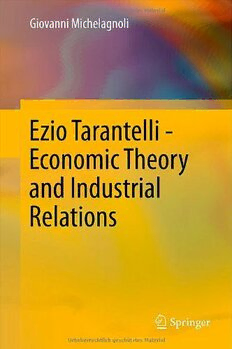
Ezio Tarantelli - Economic Theory and Industrial Relations PDF
Preview Ezio Tarantelli - Economic Theory and Industrial Relations
Ezio Tarantelli - Economic Theory and Industrial Relations . Giovanni Michelagnoli Ezio Tarantelli - Economic Theory and Industrial Relations GiovanniMichelagnoli,PhD DepartmentofEconomics UniversityofFlorence Italy [email protected] ISBN978-3-642-22311-2 e-ISBN978-3642-22312-9 DOI10.1007/978-3-642-22312-9 SpringerHeidelbergDordrechtLondonNewYork LibraryofCongressControlNumber:2011938154 # Springer-VerlagBerlinHeidelberg2012 Thisworkissubjecttocopyright.Allrightsarereserved,whetherthewholeorpartofthematerialis concerned,specificallytherightsoftranslation,reprinting,reuseofillustrations,recitation,broadcasting, reproductiononmicrofilmorinanyotherway,andstorageindatabanks.Duplicationofthispublication orpartsthereofispermittedonlyundertheprovisionsoftheGermanCopyrightLawofSeptember9,1965, initscurrentversion,andpermissionforusemustalwaysbeobtainedfromSpringer.Violationsareliable toprosecutionundertheGermanCopyrightLaw. Theuseofgeneraldescriptivenames,registerednames,trademarks,etc.inthispublicationdoesnotimply, evenintheabsenceofaspecificstatement,thatsuchnamesareexemptfromtherelevantprotectivelaws andregulationsandthereforefreeforgeneraluse. Printedonacid-freepaper SpringerispartofSpringerScience+BusinessMedia(www.springer.com) Foreword IhadtheprivilegeofworkingwithEzioTarantelliduringthelastfewyearsofhis life and, of course, greatly admired his enthusiasm and his ideas. The Italian political economy is richer for having had his analyses and proposals for many years, and poorer for his passing on in early 1985. So, when I heard about Michelagnoli’s project, I though the book constituted a tribute to him. I was wondering if this effort was well addressed. Why to write a book like this? Is it worthit,today,tostudyTarantelliideas?Lookingattheprojectwithattention,my ownmotivationliesintheconvictionthatthisisaviableandrespectableanalysisof the events, the ideas, the agents’ expectations and their behavior which have characterizedtheeconomyinthelastandcrucialdecadesofthetwentiethcentury. This book is not simply a collection of largely discussed events, but represents a fine historical reconstruction and a critical analysis capable of describing the evolution of contrasts and the institutional and socio-economic settings which have characterized that crucial and perhaps the most dramatic, period. Thinking aboutTarantelliproposalsagainmeansthinkingabouttheItalianeconomichistory ofthelast40yearsagain.Atthebeginningofthe1970s,theeconomywasunder- going a profound transformation in all its markets, behavior, expectations and strategies. International relations and the political economy were also calling for a change. Industrial relations, inevitably suffered this transformation, but also affected dynamics and outcomes of this transformations. Moreover, the changing modelforanalyzingandpredictingtheeconomicsystemwasremarkablyaffected by the first big oil shocks, generating new prospective structures. The dramatic surgeinoilpricessincetheeconomicboom,hasdisruptedthetraditionalmodelsto interpret and predict the economy. Stagflation brought about the great struggle amongtheeconomicagents(firmsandworkers)tosecureincomeanddevelopment. We watched the first major structural break since the Second World War, which requiredadifferentwayofthinkingandacting.Theanalysisofthispeculiarperiod isalsousefultostudythereactionofagentsandtheeconomicinstitutionstoshocks andeventsnotpredictedaswellastoproposalandsolutions.Theyhaveinevitably affected the process that led to our economic situation. The market is sometimes v vi Foreword viewedasaLeviathanwhotreatsaneconomylikeasinglepersonincapitalletters. Trade Unions and employers Unions do the same for their memberships and pursuing their goals envisage a status quo as being a “war of all against all”. An economyinademocraticsocietyisnotamonolithiccoalitionthatpursuesitsgoals withthesamesingle-mindeddeterminationasitsindividualcitizens.Thedecisions it makes reflect a whole raft of compromises that are necessary to achieve a consensus among people, firms and workers with aspirations that will often be verydifferent.AllthisbringsustothinkoftheeconomylikeaPrisonersDilemma, andalthoughEzioTarantellididnotusetheoremsandconceptsofgametheory,his purpose was to solve this “dreadful” Dilemma to bring the economy towards the unique Pareto efficient solution. He was perfectly aware that the market solution, withthesocialparts(unionsandemployers)inadangerouslystrongoppositionled totheinefficientsolution(thetypicaldominantsolutionintheprisoner’sdilemma) or(evenworse)tootherspossibleinefficientsolutionscharacterizedbyafreerider behavior.Thepossibleoutcomes,wereanimpoverishmentofworkersinonecase, andadropinprofitswithaslowdownofinvestmentintheother.Asshownbythe Folk Theorem, there must be another solution, based on cooperation between the social partners and conducted by appropriate “trigger strategies”. This is the frameworkofanalysisofTarantelli,anditisimportantbecauseitisoneofthefirst applicationsofthecooperativesolutioninEuropewhoseessentialingredientswere conceptas“agreementasacommitment”,“reputationoftheeconomicinstitutions andsocialactors”,“credibleannouncement”.Thispatternofanalysiswasimportant both because it was able to show a different solution to the standard proposed by many, and because on that occasion the scheme proved to be the most effective solution,whilemaintainingtherealincomesandshowingthewayforanagreement thatcouldgettheeconomyoutofstagflation.Indeed,suchacompromisewashard to envisage. The problems were how find a median position between those who addresstheirattentiononthewrongproblem,thosewhodonotseethataproblem exists and those who try to benefit from this situation. The “power of ideas” is therefore intended to be interpreted literally. It is intended to serve as a basis for making judgments about the real economy and the models to interpret it. To this end, the punitive “trigger strategies” (Tit for Tat or whatever) are not enough: in fact,oftentheplayersinvolvedareverymyopic.Tothisend,“cheaptalk”is,again, notenough:cheaptalkwillneverpersuaderationalplayerstoactcontrarytotheir own interests, it may help to coordinate their endeavors, but a commitment is required and a guarantor that controls and ensures compliance with this commit- mentisalsonecessary.Theroleoftradeunionsinacooperativegame,theirhelpin coordinating actions against inflation and the “political exchange” with the Gov- ernmentwhich,alongwiththeCentralBank,announcetherulesofthegame(and thereforearecredibletounionsandemployers)shouldbereadinthisscheme.The intricacy of the Italian system is well known; it is determined by a complex interactions between social, institutional, political and economic actors. This is thehistoryreconstructedinthisbook,withoutbeingoverwhelmingbythefounda- tions of game theory, but reporting schemes, discussions, theories, economic and political facts, agents’ strategies which emphasizes the peculiarity of the Italian Foreword vii situation and the importance of Tarantelli’s ideas and suggestions. I hope it will appeal to students who want to learn a little about the history of the Italian and Europeaneconomyandthecrucialperiodofthe1970sand1980s.Thebookhelps toexpandthediscussionontheseissuesbeyondtheconfinesofajournalarticleon one hand, and develops the political economy analysis beyond the confines of newspaperarticlesontheotherhand. BrunoChiarini . Preface TheEuropeanleftwing,inparticulartheItalianandtheFrench,istheonlysocial force able to put on the ropes the conservative block in Germany and in England through the strengthening, in the name of the shield of the unemployed, of the opposition, that in these countries still exists. The contrast to unemployment is a goal as meritorious for such a left wing, as it is stodgy for those governments which today areslowing down the recovery and the pro-Europe instances.This is thereasonwhythecontrasttounemployment[...]doesnotrepresentonlythefirst step towards the European Union, but also, maybe, a political guideline aiming atjoiningalltheleftwingpartiesinEurope.IsthisjustUtopia?TheUtopiaofthe weakisnot,maybe,thestrongones’fear1? This is what Ezio Tarantelli wrote a few weeks before being murdered by two red brigades killers when he was 44, on 27th March 1985. This book aims at reconstructing his contribution to economic analysis and the economic and socio- logicaltheorieswhichinspiredhiseconomicpolicyproposals. The content is organized in five chapters, the Appendix includes Tarantelli’s scientificwritingsbibliography. Thefirstchapteraimsatprovidingahistoricalframeworktodescribethesocial, politicalandeconomicsettingforTarantelli’sanalysis. The second chapter offers a short profile of Tarantelli’s intellectual biography. Inthiscontext,JoanRobinson’sanalyticalcontributiontotheschemeofanalysisof Tarantelli will be firstly examined. It is, in fact, mainly thanks to Robinson’s approach that Tarantelli was able to formulate his cyclic version of the mark up principle.Asitwillbeseenlateron,itisbasedonthenotionof“subjectivenormal price”whichsheexpoundedintheAccumulationofcapital.Wewillthenconcen- trate on Tarantelli’s intellectual connection with Modigliani. Though they wrote 1Tarantelli(1985[7],pp.576–577).Thenumberinthesquaredbracketsreferstotheappendixof Tarantelli’sscientificwritingsbibliography. ix x Preface several remarkable essays together, concerning analytical refinements of Phillips curve,thisconnectionhasbeenveryfruitful,notonlyfromtheanalyticalpointof view.AlsoTarantelli’smethodologicalrevisionofhis“fourcards”PostKeynesian labourmarketmodelcanbelargelytracedbacktoModigliani’sinfluence. ThethirdchapterwillfocusonTarantelli’sanalyticalrefinementsandgeneral- izationstothePostKeynesianlabourmarket,movingfromhiscriticismtothenew labourmicroeconomicsapproach. The fourth chapter will deal with Tarantelli’s reformulation of the Post Keynesian model in a conflictual scenery. Within this context, Tarantelli’s social conflict theory will be examined. As is known, it rested on the generation leap hypothesis,i.e.theemergenceattheendofthesixtiesofamorecultivatedlabour force,whichcouldnotbestructuredinahierarchicalandauthoritativeorganization model inherited from the past. Such a phenomenon would cause a short circuit betweenthetwo“collectivebrains”,thatistheconflict. The fifth chapter will be dedicated to a survey of the main economic policy measures elaborated by Tarantelli, i.e. the OPEC surplus recycling, the inflation recovery proposal and the shield of the unemployed and to a brief exam of economists’attitudestowardsthem. Florence GiovanniMichelagnoli
